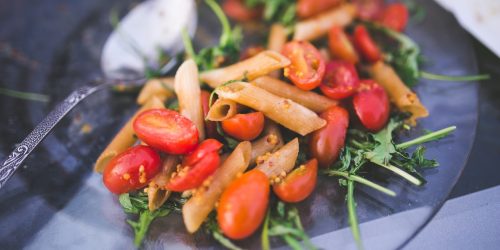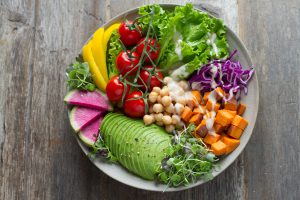
A healthy diet is one of the most important ways you can reduce your risk of developing heart disease.
It is always important to remember that it’s not just whether one particular food group is ‘bad’ or not but to look at your eating as a whole and ensure you eat a well-balanced diet with plenty of plant-based foods. It is essential to include a lot of vegetables, whole grains and fruits as well as some fish and seafood and protein such as lentils beans and tofu.
If you were interested in receiving FREE Heart Healthy Recipes, simply join our Heart Health Club here.

Avoid Saturated Fat
These are found mainly in animal products. Eating saturated fats raises the total level of cholesterol in your blood, as well as the level of LDL (bad cholesterol). This contributes to problems with blocked arteries.
Food sources include:
- meat, including lamb, pork, fatty beef, processed meats
- chicken with skin
- many baked goods and fried foods
- palm oil, palm kernel oil, and coconut products – oil, cream and milk.
Meat
Always a topical one… The latest healthy eating guidelines encourage all Australians to limit their meat intake. The consumption of unprocessed beef, veal, pork, and lamb should be restricted to 350g per week. Eating deli and processed meats should be avoided as a part of a heart healthy diet.
Fish and legumes are preferred protein sources for a heart healthy diet however, between 1-3 meals per week which include unprocessed red meat, can be included as long as weekly intake is less than 350g. There is currently no recommended intake for unprocessed poultry.
Dairy
If you are a healthy Australian and love dairy, well, it’s good news for you! The latest guidelines have toned down concerns regarding full-fat dairy products. Latest research has shown little evidence to restrict them as they have a neutral effect on a healthy person’s risk of heart disease or stroke. It is still advised however to stick with reduced-fat dairy for those with high cholesterol, heart disease or type 2 diabetes.
Eggs
 In the recently announced heart healthy guidelines, the weekly limit on eggs is gone! Breakky out this weekend for all healthy Australians…
In the recently announced heart healthy guidelines, the weekly limit on eggs is gone! Breakky out this weekend for all healthy Australians…
If you already experience heart disease or type 2 diabetes however the recommendation is to stick with seven eggs a week or fewer as eating more has been linked to a higher rate of heart disease or stroke.
Include Fish
Have at least three fish meals (fresh or canned) per week. Fish contains omega-3 fats, which lower cholesterol levels and help prevent blood clotting.
Oily fish is particularly high in Omega 3, types of oily fish include tuna, salmon, sardines, mackerel, mullet, trout, swordfish.
Reduce your Salt intake
While many of us analyse the fat and sugar content of our food, few of us spare a thought for the salt content and the impact it’s having on our body and health. Almost all Australian’s put themselves at risk by eating too much salt. Salt is sodium chloride. When we talk about cutting down on ‘salt’ we really mean cutting down on sodium.
Benefits of lowering salt
People need a very small amount of sodium to be healthy, which is present naturally in foods like seafood, meat, dairy, eggs and some vegetables. Reducing salt intake reduces the risk of high blood pressure and ensures better cardiovascular health for most people.
Reducing salt intake can help people with high blood pressure and even people with normal blood pressure stand to gain significant long-term benefits from cutting salt from their diets.
Hidden salt in our diets
Around 75% of the salt we eat comes from processed foods. Many Australians are aware they shouldn’t be eating too much salt and have stopped adding salt in cooking or at the table. However, common foods such as bread, cereals, processed meat and pre-prepared meals can have very high levels of ‘hidden’ salt.
 Increase your fruit & vegetable intake
Increase your fruit & vegetable intake
Eat at least two pieces of fruit daily. Vegetables have been shown to be protective against heart disease and certain cancers. Aim for four or five serves per day.
Eat Fibre
Soluble fibre can help lower cholesterol reabsorption, and assist with blood glucose level control. Find it in oat bran, barley bran, wheat bran, rolled oats, legumes (e.g. kidney beans, chick peas, lentils), wholemeal breads and cereals, psyllium husks, fruit and vegetables.
Insoluble fibre is good for bowel health. Sources include fruit, vegetables and bran.
Manage your cholesterol
High levels of cholesterol in the blood increase your risk of heart disease.
- Only eat offal meats, such as liver, brains, kidneys, once a month or less.
- Only eat prawns, shrimp, octopus and calamari once a week or less, as they are fairly high in cholesterol. Other shellfish are low in cholesterol and may be eaten as desired.
Maintain a healthy weight
Many people with heart disease are unable to do much physical activity or exercise, and find that they gain weight while eating their usual diet. There are ways however to stay active, when you have a heart condition. For a gentle walking program to get you started and to read more about exercise guidelines click here.
It is very important to eat a well balanced healthy diet with plenty of plant-based foods to help you to lose or manage your weight, and to lower your cholesterol and blood pressure.

